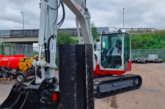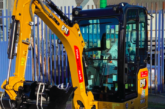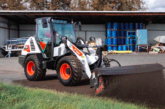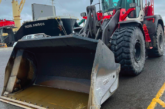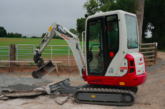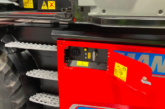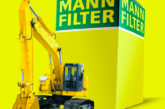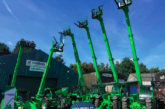
Construction Plant News Editor, Lee Jones investigates the problem of non-compliant imports
The UK statutory obligations on emissions safety and noise – which are in turn based on European Union regulations – apply to anyone selling machines into Europe, and are equally applicable to individuals placing machines on our domestic market as they are to manufacturers.
Standards on these three crucial areas of machine specification vary widely around the globe and, although there’s nothing wrong with someone buying a piece of kit that’s fully compliant to EU law and importing it into the UK themselves, problems arise when machinery that was never intended for Europe find its way into this country.
Although it is the seller who holds the primary responsibility for ensuring that machinery sold is compliant there could also be significant legal ramifications for an end user who find themselves, however unwittingly, in possession of equipment that is not EU complaint.
There are various pieces of legislation relating to emissions, for instance, which could place restrictions on where plant can be used, and those regulations will apply to when the machine was first placed on the market in Europe.
Initiatives like the London Low Emission Zone are likely to spread exponentially around our cities, but some of the largest civil engineering and infrastructure projects have already set the bar very high in terms of the emissions it permits from construction machinery, which means a non-compliant machine will not be permitted on those sites in the first place.
For the Construction Equipment Association, however, the key consideration is safety: “I’ve seen excavators operating here that are wholly unsuitable for lifting duties,” explains Malcom Kent, Senior Technical Consultant at the CEA.
“Although these units were obviously intended for that purpose in that they have lifting eyes on the tipping link, but burst valves, a lifting chart or overload warning systems were all absent.
“That makes these units unsafe for those duties, and if somebody bought one of those machines, and an accident on site was the result, they could then be in serious trouble.”
Moreover, the potential penalties for knowingly supplying a machine that does not conform to EU legislation are high, and they apply to anyone who is placing them on the market.
If a contractor or hirer goes to an overseas auction, buys a machine and then brings it into the UK themselves, then they would equally be subject to the full rigour of the law.
These can include confiscation of the goods, with the consequential loss of the capital outlay, and a heavy fine of up to £5,000 per offence. For a contractor, if the HSE finds a non-compliant piece of machinery in operation on site, then either an improvement or prohibition notice could be issued.
We asked Malcolm how hirers and contractors could protect themselves from unknowingly buying a non-compliant machine? “If a unit were genuinely intended by the manufacturer for the European market it will have with it the original declaration of conformity.
“There are various companies that will sell you a retrospective declaration of conformity for any machine that you nominate for a fee of anywhere up to £1,500, and that piece of paper will purport to be a genuine document.
“It will, however, be signed by someone other than the manufacturer and is entirely bogus. If you are being offered a declaration of conformity which is very obviously not from the OEM, then this is an indication that that machine is a non-compliant import.”
Machinery that is discovered to be non-compliant is usually found at auctions, what is less clear is how serious the problem might be in terms of private sales – and a buyer’s watchwords should always be caveat emptor.
In terms of classes of plant the CEA has identified an active trade in tracked dumpers from the Far East: “I recently saw a brand new tracked dumper sold at auction,” recalls Malcom, “and the new owner was very pleased that he’d got a new machine for a very good price, but the unit was without any of the appropriate ROPS and FOPS protection.
“These are amongst the most dangerous examples of non-compliant plant that I have ever encountered. If the appropriate protection is in evidence, and just such an accident occurs, there is a good chance the driver will survive. Conversely, if ROPS and FOPS standards are absent then the likelihood is they will be crushed and killed.”
So what does the future hold? Given the demands on the construction equipment sector from future infrastructure projects in particular, could we see a potential feeding frenzy of new contracts satisfied with an unpalatable diet of grey imports?
“Wherever there is an increase in demand there is always the potential to suck in non-compliant machinery because there will always be those who are looking to make a fast buck – a company that wins a contract, needs five new machines and doesn’t particularly care where they come from.
“If big projects, like HS2, demand strict checks on compliant machinery on site there is a danger that will be push the problem further down the food chain to smaller sites and operators.”
From a legal perspective the question of who is doing the importing remains frustratingly obscure. If an auction house is found to be in possession of non-compliant machinery that it is selling to an unsuspecting public then they are legally free to take the line that they do not own the plant – they sell it and take a commission.
“We believe in our reading of the law that they do have a legal responsibility to ensure machinery is compliant,” Malcolm concludes, “but that needs to be a position that is tested in court.
Indeed, the European Construction Guide Document to Machinery Legislation sets out the responsibility of auction houses is very clear and that they are acting as dealer, thus they should ensure that it is compliant.”

